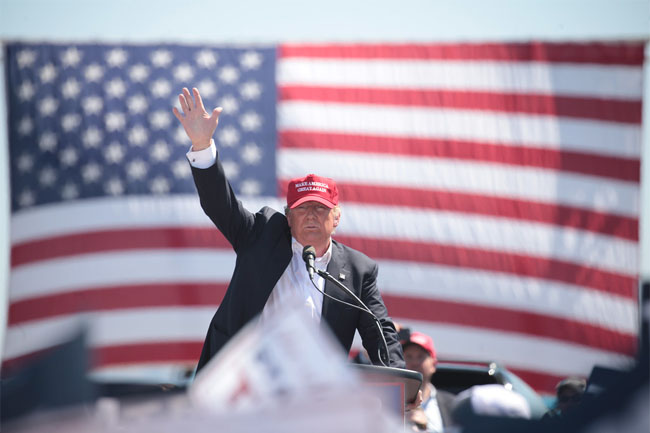What explains this tidal wave of authoritarians taking over supposedly mature secular democracies? George Grundy reports.
IN APRIL 2017, less than three months after taking office, Donald Trump repealed legislation outlawing the hunting and killing of hibernating bears in Alaska. The news, which conservationists said would "shock the conscience" of animal lovers, was greeted with incredulity by a world more used to Obama-era morality.
At around the same time, the Trump administration also passed a law specifically aimed at allowing easier purchase of weapons by people with severe mental illness. This wasn’t one clause within a broader bill — the document specified just one thing, that mentally ill Americans could now buy weapons more easily.
Pretty much everyone, apart from fringe lobby groups, wondered the same thing: who the hell supports killing hibernating bears or allowing disturbed people to buy guns? Yet in America at least, laws written in the face of overwhelming public opposition are not that unusual. 89% of Americans (including 83% of Republicans) support background checks on gun purchases, but the 11% who oppose these measures hold sway, despite mass shootings increasing to a level where there is almost one major incident every fortnight.
Highly unpopular decisions, taken by leaders elected to serve the will of the people, are now commonplace in major Western democracies. Sure, there have always been instances in history where rulers have taken unpopular stances in the hope of guiding the public to wiser outcomes. In 2019, however, there is a sense democracy itself is in crisis as a series of extremist politicians enact consequential policies that often don’t reflect the public’s wishes at all.
Hard right strongmen (they’re all men) have taken control of some of the world’s largest democracies in a wave of authoritarian faux populism. Trump is perhaps the most extreme, but Bolsonaro in Brazil, Morrison in Australia and Johnson in Great Britain are recent additions to a club that already included Duterte in the Phillippines, Orban in Hungary and Erdogan in Turkey.
The AMAZON'S Tropical Rain Forest of BRAZIL are LARGEST Biodiversity Resorvoir of our survival. It's life behind & beyond the green trees. Save the ANGIOSPORA, SUSTAIN THE LIFE. https://t.co/mFRsXzEtY2
— Sanjay Jain (@imforseersanjay) October 18, 2019
How did this happen? What explains this tidal wave of authoritarians taking over supposedly mature secular democracies?
What little consensus there is often focuses on two things: mass migration from Third World countries causing nationalist tensions in the West and the long-term effect of the global financial crisis of 2007/08, when millions fell into poverty. People who saw their once comfortable lives upended (the theory goes) were more open to the message from authoritarians who promised to smash the status quo and make their country work again.
There is, to be sure, merit in both these explanations, but it’s worth considering whether the public are actually supportive of many of the policies of these leaders. Do Americans really want to spend $25 billion on a border wall but not have universal health coverage? Do Brazilians share their President’s view that the best thing the Amazon is an active program of deforestation? Do the citizens of Australia really think that the best response to climate change is to build one of the largest coalmines on earth?
If the answer is no, it begs the question as to why these extremists keep getting elected. It’s unlikely that residents of Sao Paulo agreed with Brazil’s approach to the environment when the city was plunged into almost total darkness in August due to the fires in the Amazon. If 71% of Americans want universal healthcare, why did they elect a man who so clearly wants to remove the inadequate coverage that’s already in place?
Again and again, it’s democratic mechanics that appear to be failing, not the people’s ability to choose good from bad. The system often dictates the outcome in a way that dramatically alters a nation’s destiny.
Below are five examples from today.
In America, Donald Trump is President, despite losing the popular vote by nearly three million votes. Indeed, Republicans have lost the popular vote in six of the seven elections since 1992. As Michael Moore pointed out, on a wide range of issues, Americans consistently poll far to the left of the policies enacted by their politicians. Yet the structure of the Senate, combined with the arcane electoral college, means what Americans want is very rarely what they get.
Trump who lost the popular vote by nearly 3 million votes, and had his party get wiped out last year, claims that Democrats are impeaching him because they can't beat him. pic.twitter.com/pKZt0jfmBK
— Sarah Reese Jones (@PoliticusSarah) September 25, 2019
Australia’s current government appears to have been handpicked by a billionaire who spent $60 million advertising his political party without trying to win a single seat. The British Prime Minister was handed the keys to 10 Downing Street by just 0.13% of the population, yet is now charged with negotiating the nation’s most consequential decision since World War II. Jair Bolsonaro holds the fate of the Amazon in his hands, but rose to power in the most controversial of circumstances, involving the gaoling of a political opponent who remained the most popular politician in Brazil despite not being on the ballot. Viktor Orban came to power in Hungary after an election in which his party got less votes than the man he beat.
Electoral procedures and processes, written with the best of intentions to try to level the playing field, often now seem more powerful than popular will in determining the outcome of elections.
Imagine the change to world history and to our existential environmental peril, if the votes all stayed the same but the systems were different. Imagine America after eight years of President Al Gore and now under the steady hand of Hillary Clinton — both of whom won the popular vote. Britain under a coalition government headed by Jeremy Corbyn, as would probably be the case with proportional representation. Australia led by Bill Shorten, with the Greens holding the balance of power. Without a single vote changing we would live in a dramatically different world. Given the array of despotic leaders running the world’s leading democracies today, it’s sobering to picture how different things might be if the systems were changed to something equally, if not more, democratic.
We are yet to see an example of a major democracy rejecting the rule of one of these wannabe dictators, but it is surely coming. There are plenty of examples throughout history of tyrannical regimes being overthrown and more benign governance taking its place. America overthrew the rule of the British and devised perhaps the single greatest democratic system in human history. Germany followed the Second World War with a series of leaders who overcame the horrors of their recent history and rebuilt the nation to become Europe’s strongest.
The problem is, there are few examples of transformative changes to a nation’s system of government that aren’t preceded by great tragedy. Those who hold political power have the least reason to change the system that put them there.
Change is coming. With environmental catastrophe racing across the horizon towards us, it has to whether we like it or not. But it’s very much an open question whether we can handle the dramatic changes required in our societies without first enduring catastrophe and recent evidence suggests many of the world’s leading democracies are operating electoral systems that aren’t allowing the will of the people to stave off this risk.
The Real News
— Kindly Atcha (@AtchaJohn) May 29, 2019
The New Authoritarians
David Renton discusses his new book.
Talking upon the topic of the populist right-wing manifestation of today..
Video ~10 mins https://t.co/Mj4qlcmMfT
George Grundy is an English-Australian author, media professional and businessman. He currently maintains the political blog americanprimerweekly.com, providing informative and entertaining commentary on major events in politics and sport.
 This work is licensed under a Creative Commons Attribution-NonCommercial-NoDerivs 3.0 Australia License
This work is licensed under a Creative Commons Attribution-NonCommercial-NoDerivs 3.0 Australia License
Support independent journalism Subscribe to IA.

RT BernieSanders: Fossil fuel corporations and right-wing authoritarians from Brazil to the United States are driving the climate crisis.
— Feel The Bern 2016 Ⓥ (@_feel_the_bern_) September 3, 2019
The only way we can take them on is with a mass movement for a Green New Deal. pic.twitter.com/9tygRpv7hq











